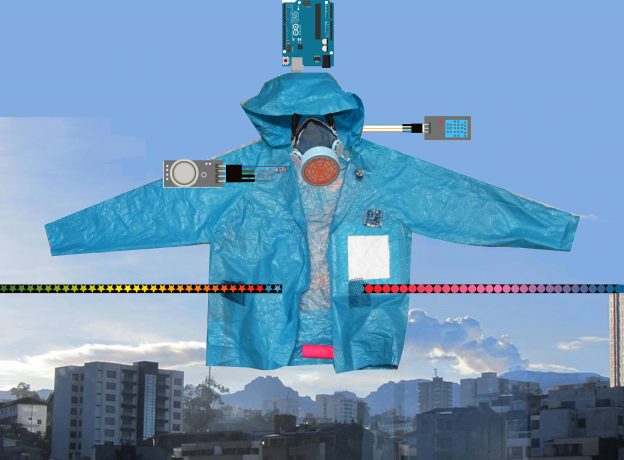NEW CALL FOR TRIALS AND FAILED WORKS, PROTOTYPES, SAMPLES & PROJECTS to be presented at SALONUL DE PROIECTE, Bucharest, February – March 2018 (following a first presentation during PIKSEL Festival, Bergen, Norway)
Project initiated by Tincuta Heinzel and Hillevi Munthe.
Deadline for submissions: 5th of February 2018.
CONTEXT
Within the realm of electronic and smart textiles there have been promising technological investigations that never quite managed to reach their potential. However, despite these disappointments, industrial and academic research, as well as artistic inquiry, continue to explore the possibilities of electronic and smart textiles.
Following the first phase, during which electronic devices were attached to fabrics and jewelry, came a new stage—one that integrated electronic components into textile structures. As a result, the dream of a flexible computer could soon materialize. The next step that is being considered is the development of new reactive materials.
Rather than presenting this endeavor as “the next big thing,” our investigation seeks to understand the various stages of its development, exploring the paths of how and why they occurred, as well as when they did.
Every development has its price. Failure has always been part of the creative process, as a learning experience. “Those who do not fail are those who didn’t try,” or “An expert is a person who has found out by his own painful experience all the mistakes that one can make in a very narrow field” (1) are just some of the expressions used to describe the sinuous ways of bringing something new to life. In many fields, recording glitches and keeping a catalogue of failures are part of the research process.
In our research we can also have a lot of trials and errors, attempts to improve what we have already done. These benchmarks are not always in the spotlight, but taking a look at the process itself says a lot about artists, designers, technologists thought processes. Test-benches are a form of thinking through and with the materials, a form of playing around, of advancing by small steps.
But failures and trials have their drive not only in the technical constraints. In the age of “fast prototyping,” “publish or perish” and “start-up competitions,” our project is also an attempt to reflect on the present technological boom and innovation obsolescence, encouraging an ecological perspective which will take into consideration the whole cycle of conception, consumption, ageing, and degradation of technology. By doing so, the present project wants to put into a new light technically overstepped products and failed prototypes, rejected wearables and e-textiles projects, and to launch a debate about the “fast” design and scientific practices that define our present.
An interdisciplinary field, electronic textiles and wearables are also the ground for a series of interdisciplinary clashes between textiles and electronics, between software and hardware, between open source and commercial platforms. These clashes are producing inspiring work, but some encounters are also the source of frustration and irritation.
This collection of attempts, failures, trials and errors it is not intended to praise the failures, nor to minimize the successes of wearables and e-textiles. By questioning the idea of failure and success, the project will put emphasis on art’s capacity to critically and, at the same time, poetically and self-ironically address contemporary challenges and concerns. In a sort of forensic processes and significance tests, the present project calls for technical trials and errors, failed prototypes, and rejected art and design works in order to put into a new light the potential of e-textiles and wearables. Our intention is to show the richness of the processes, of what has been already done in the electronic and smart textiles domain and to bring into the discussions ethical, ecological and sustainability issues of wearables and e-textiles. The focus will be on the distance between ideals and constraints, between concepts and realization.
CALL FOR TRIALS AND FAILED WORKS, PROTOTYPES, SAMPLES & PROJECTS
Having as starting point the electronic and reactive textiles (but not limited to them), we expect visual documentations (photos, videos), samples, technical documentations and testimonies of:
- failed and rejected product development attempts,
- trials and errors products and prototypes,
- overstepped products and prototypes,
- non-working art works and prototypes,
- rejected scientific papers and projects,
- code and protocol bugs,
- encountered ethical issues.
The authors are asked not only to send a documentation of their un-successful or short life projects, but also to offer a reflective perspective on their attempts and the afterlife of their projects. The applications are to be submitted on-line, by completing the forms available on our website. You will be asked to offer details about the dates of the projects, a short description, drawings, technical diagram, codes, photos and videos of your art works, products and prototypes, a reflexive note on your attempts, details about the projects pre- and after-life.
The project’s website will present an exhaustive account on the received projects, while the curated part of the exhibition will offer a thematically structured version of them. The curators will reserve the right to invite some of the submissions to be exhibited in a physical form during the Piksel festival. Unfortunately no fees can be payed, the only costs that the organisers can cover are those related to the shipping of the invited works. The submissions will be made under creative commons licences and will be available for open consultation. A series of conferences, performance sessions and workshops will give a critical perspective on the project’s main findings.
The project is supported by the Norwegian Art Council, the Norwegian Association for Arts and Crafts and AFCN – Romanian Agency for the Cultural Fund.
IMPORTANT DATES
Deadline for submissions: 5th of February 2018.
Exhibition: 21 of February – 1st of April 2018.
(1) BOHR, Nils. As quoted by Edward Teller, in Dr. Edward Teller’s Magnificent Obsession by Robert Coughlan, in LIFE magazine (6 September 1954), p. 62 via Wikiquote.
Website: www.trials-and-errors.com/call

